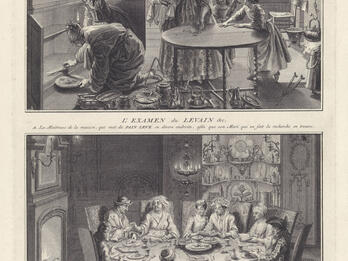An Allegorical Religious Play
Offstage, Edom and Jonen Dalim.
Edom:
Chase that filthy beggar away from my door!
Jonen:
God punishes those who despise the poor.
Israel:
Edom sees my tatters and feels disgust.
Law:
But when Jonen Dalim sees them, its face turns ashen.
Israel:
Jonen Dalim?
Enter Revelation and Charity through two separate doors.
Revelation:
An organization that does what it must
To ease life’s pains in a charitable fashion.
Charity:
Jonen Dalim, so humane and so just
That its head is crowned with white plumes of Compassion.
Law:
Here stands God’s treasurer, known as Charity,
And over there, Revelation, God’s emissary.
Israel:
Why has Charity come here? What is Revelation’s aim?
Revelation:
To extol the goodness of Jonen Dalim’s name.
Charity:
To praise the work of this holy society.
Revelation:
To reveal the reward for its unfailing piety.
Charity:
Its Brothers and President care for the Poor.
Israel:
Indeed, we want to hear more.
Charity:
Jonen Dalim is a holy Brotherhood
With seventy Brothers, godly and good:
A Sanhedrin of mercy, decisions deciding
With its own honest Solomon wisely presiding.
Their regular Offerings help others to thrive:
That manna, that money, keeps people alive.
In working to battle despair and disparity,
They prove that they know the true essence of charity.
Revelation:
There are eight levels of charity to learn
If men would be generous with what they earn.
And Rabbi Bahya, the definitions are narrow:
1. The first and lowest level of all
Is he who gives grudgingly, in amounts too small.
And God rewards him grudgingly, as one would,
By giving him bad things before giving him good.
2. The second level reflects two types of men
Who give little, but willingly, now and then.
In the next life, the Wealthy shall have no more
Than they gave in this life to the Poor.
But men with no wealth, who give all the same,
In God’s Glittering Mansion shall find acclaim
For He has arranged the Hereafter such
That although they gave little they shall have much.
3. In level three, we see, man gives what is needed
To the poor at his door once they’ve groveled and pleaded.
He’ll gladly alleviate hunger and thirst
But forces the needy to ask for it first.
For such a man, Heaven’s Judge reserves
Precisely the treatment his action deserves:
If he wants the Almighty to pity his fate
He’ll have to come begging in front of the gate.
4. At level four, the heart is tasked
With giving enough without being asked,
And saving the Poor the embarrassment
Of describing their predicament.
The Divine Creator responds in kind:
Sensing prayers unformed in the givers’ mind,
As He did for Moses in times of old,
He fills their needs before being told.
5. And level five pursues the aim
Of sparing the recipient from shame
The talmudist hauls donations behind him
And strolls the streets where the Poor can find him.
He stares straight ahead so he’ll never know
Who took the gifts he had in tow.
The Lord rewards those whose unseeing grace
Can never be thrown in a poor person’s face.
6. At level six, so greatly prized,
The donor’s identity is disguised.
With coins in hand, the scholar roams
Delivering alms to paupers’ homes.
He slides them quietly under the door
And slips away unseen once more,
For God enriches those who give
And help the needy where they live.
7. The seventh level of magnanimity
Relies on mutual anonymity:
They give through the Temple, not in their name,
So no one knows from whom it came
And no donor knows whom he uplifts.
God blesses those who make such gifts.
A secret gift placates resentment (Proverbs 21),
Replacing enmity with contentment.
8. The eighth and the highest is well known:
It takes the form of a friendly loan.
Heaven is ever praiseful towards it,
And always values and rewards it.
These eight pieties are found in Jonen Dalim,
From simplest alms to beneficence supreme.
News of their work inspires awe
And acts as a trumpet to spread God’s law.
Translated by Steven Capsuto.



